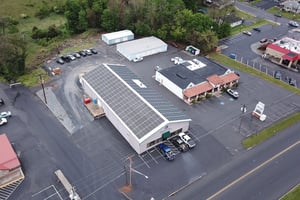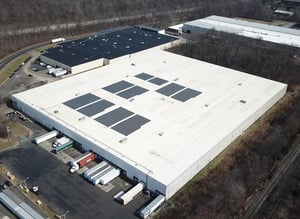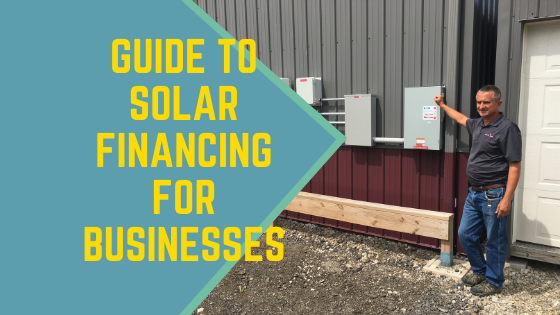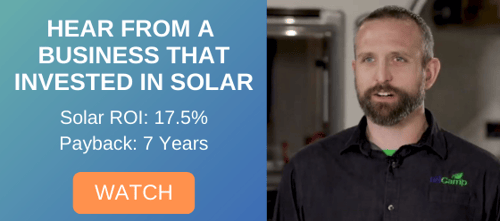A solar energy system can be an extremely valuable asset for small, medium, and large businesses alike. Not only can solar power drastically reduce your electricity bills, but it can also decrease your owed taxes and increase your property’s value.
But for all of solar energy’s benefits, there’s one common roadblock: the initial installation cost.
Advances in technology have reduced the price of solar system components, and attractive government incentives sweeten the deal even more. But it still stands true that solar energy requires a significant upfront investment. That investment may pay for itself in just a few years, but unless you have sufficient cash on hand, you'll still need to get your hands on the capital required to install the system.
However, you shouldn’t have to miss out on the thousands of dollars a solar energy system can save your business just because of short-term financing roadblocks. In this blog, we’ll go through the three common options for solar financing for businesses.
Commercial Solar Financing Options
Purchasing Your System Outright with Cash
The ideal situation for most businesses is to purchase the solar system outright with cash. This positions you as the system owner, giving you 100% of the benefits from solar - from the electricity savings to the tax savings.
Purchasing your system with cash may be easier than you think. While a solar panel system does require a substantial investment, current incentives make installation costs much lower, which makes raising the money needed to install the system easier.
 First and foremost, all businesses that pay taxes will be eligible for the 26% Solar Investment Tax Credit (ITC) from the federal government. This allows businesses to cut their taxes by 26% of the cost of their system the year it’s installed.
First and foremost, all businesses that pay taxes will be eligible for the 26% Solar Investment Tax Credit (ITC) from the federal government. This allows businesses to cut their taxes by 26% of the cost of their system the year it’s installed.
There is no cap on the amount of money you can save with the ITC. If the 26% savings is larger than your tax burden for the year your system is installed, you’re able to carry those savings up to 20 years in the future until you’ve gotten back the full 26%.
Additionally, businesses can also depreciate 100% of the solar system’s cost basis in the first year. This 100% bonus depreciation allows you to accelerate all the federal tax benefits to immediately help offset installation costs.
There may be other incentives available to your business depending on your state, municipality, and even your utility company.
All in all, some businesses can reduce installation costs by over half. Let’s take a quick look at an example. A 50 kW system would cover an electric bill of about $600/month. Before incentives, that system would cost about $124,100.
With the 26% ITC and accelerated depreciation, that cost comes down to just $60,448. That’s just with federal incentives available to all tax-paying businesses. Your business could qualify for additional grants and credits to bring the cost down even more.
Purchasing a Solar System with a Solar Loan
Many people don’t have the cash on hand to buy a car or a house, but with good credit, they’re still able to responsibly make these purchases. Likewise, you don’t need to have the cash on hand for your system to reap all the benefits of solar system ownership. Various lending institutions have programs available for commercial solar financing.
Lending institutions recognize the power and stability of an investment in solar power. Sure, that system may cost $60,000 to install, but the business itself will be saving $600/month on electricity for the entire life of the system, which can be 25, 30, or more years.
 And that’s not accounting for rising electricity costs. Not only is that a great long-term investment, but it’s a stable one. As long as you work with a quality solar installer who uses dependable parts, your investment will produce a return month after month, assuming the sun keeps shining!
And that’s not accounting for rising electricity costs. Not only is that a great long-term investment, but it’s a stable one. As long as you work with a quality solar installer who uses dependable parts, your investment will produce a return month after month, assuming the sun keeps shining!
Typically, we’ve found that local lenders offer the best rates and the quickest turnarounds. They may be people you’re used to working with, which can make the process go more smoothly.
Another option for you may be a capital lease. But these are different from what some people call a “solar lease.” Unlike a vehicle, building, or land lease, a capital lease allows you to physically own the solar system once it’s paid off. Capital leases typically have shorter terms than a conventional loan, and you’ll still be able to take full advantage of all the tax-saving incentives from the solar system.
If a loan or capital lease is something you’re interested in, Paradise Energy has relationships with lending institutions that can help make financing a commercial solar system easier.
Solar Leases & Power Purchase Agreements (PPAs)
If you don’t have the cash or access to a loan but you still want to go solar, there is an option. A power purchase agreement (PPA), sometimes called a solar lease, puts solar on your roof or property, gives you access to the solar-generated electricity, but doesn’t require you to pay for the installation.
Instead, you’re leasing your roof or parcel of land to a solar power developer. This developer will design and install a solar system in that area. Then, they’ll sell you the electricity the system generates at a rate that’s lower than what you would pay for electricity from the utility company. This is considered an operating lease.
While this sounds amazing up-front, there are a few things to consider. Because the solar developer is the owner of the solar system, you won’t get any of the tax-saving incentives; they will. You’ll also still have monthly payments for electricity.
Additionally, you’ll still be paying for your electricity per kilowatt-hour, just not to the utility. Your price per kilowatt-hour from the solar developer should be less than through a utility. However, you’ll need to take a close look at the PPA to ensure there isn’t a price escalator in the contract that dramatically increases the cost of electricity after a certain period.
PPAs are typically long-term agreements, often lasting 20 to 25 years, so it’s essential to make sure you’re signing a contract you’re content with.
The developer will also be responsible for any maintenance or repairs. That said, PPAs and leasing aren’t available in all areas and for systems of all sizes. You’ll need to check with your locality to see if this is a feasible option.
Which Solar Panel Financing Option is Best for You?
When it comes down to it, there’s no commercial solar system finance method that will be the best option for all businesses across the board. It all comes down to your cash flow, credit, and tax liability.
That said, we’re a strong believer in solar system ownership. It often offers a great return on investment, and it allows you to take full advantage of all the tax-saving incentives. However, a PPA with transparent and fair terms can be a great way for your business to go green and save some green if ownership just isn’t attainable.
Determining the best way to finance your business’s solar system can seem like an overwhelming task to undertake. But it doesn’t have to be, because we’re here to help.
Not ready for a quote? Sign up for our Solar Made Easy video series. We'll send you 15 short (2-3 minute), educational videos directly to your inbox.





